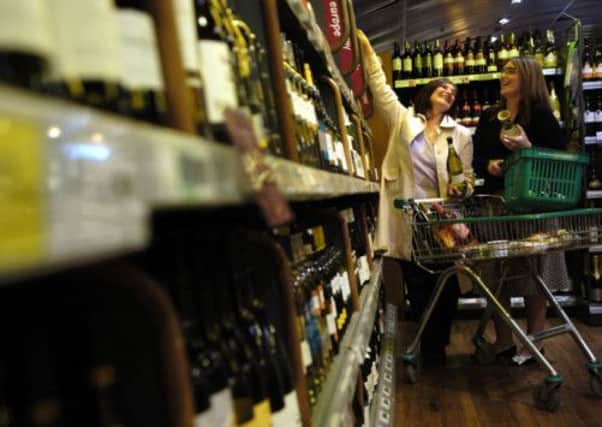Multi-buy ban sees 4.5m wine bottle sales drop


Scotland’s supermarkets and off-licences saw alcohol sales fall by 2.6 per cent overall, with wine decreasing by 4 per cent – or 12,300 fewer bottles every day – following the introduction of the Alcohol (Scotland) Act in October 2011. Sales of alcopop-style pre-mixed drinks dropped by 8.5 per cent, following the change in the law.
Similar trends have not been seen in England, where multi-purchase drinks promotions are still legal.
Advertisement
Hide AdAdvertisement
Hide AdThe figures were released as police called on the Scottish Government to put pressure on drinks manufacturers to reduce their alcohol content, or else ban them from supermarket shelves.
Mark Robinson, public health information manager at NHS Health Scotland, said of the new report: “These findings show that the Alcohol Act has had the intended impact of reducing consumption by placing restrictions on how alcohol is displayed and promoted.”
He said some retailers were trying to get around the rules by selling single bottles more cheaply, but added: “The incentive for people to buy more alcohol than they may otherwise have bought was removed and wine sales decreased.”
Dr Jim Lewsey, senior lecturer in medical statistics at the University of Glasgow and a co-author of the report, said: “Similar declines were not observed in England and Wales, where the Alcohol Act does not apply. The possible impacts of other factors, such as changes in income and alcohol prices, were also taken into account. This provides evidence that the effects were associated with the act and not some other factor.”
Meanwhile, the Association of Scottish Police Superintendents (Asps) will urge ministers to take a harder line to lessen the impact of problem drinking on crime, health and communities, during its conference later this week. The organisation will say that reducing alcohol content – and in some cases caffeine – should be the next step after minimum pricing.
David O’Connor, Asps president, would not be drawn on the products requiring action.
But cheap, high-strength beers and ciders and some tonic wines have frequently been associated with late-night violence and public disorder, and are understood to be in their sights.
Mr O’Connor said: “We were fully supportive of the Scottish Government’s stance on minimum pricing.
Advertisement
Hide AdAdvertisement
Hide Ad“However, we believe the time is right to look at the strength of alcoholic drinks and, if necessary, reduce the content and caffeine levels in some of them.”
He added: “We would ask the Scottish Government to work with producers of these alcoholic drinks. It’s something governments elsewhere have done.
“We have to look at reducing alcohol content if we are serious about reducing harm.”
Asps said the Scottish Government could even legislate to reduce the alcohol and caffeine content allowed in drinks.
Campaigners have backed Asps’ plans for a reduction of alcohol content.
Dr Evelyn Gillan, chief executive of Alcohol Focus Scotland, said: “We share the association’s concerns about high-strength alcoholic drinks, including those containing caffeine.”
A Scottish Government spokeswoman said: “We remain open to the consideration of any proposals that can contribute to reducing alcohol-related harm.” But she said any changes would have to be evidence-based.
Henry Ashworth, chief executive of the Portman Group, the social responsibility body for alcohol producers, said: “We support strong local partnerships involving the police, councils and businesses to identify and target the issues specific to each individual area.”